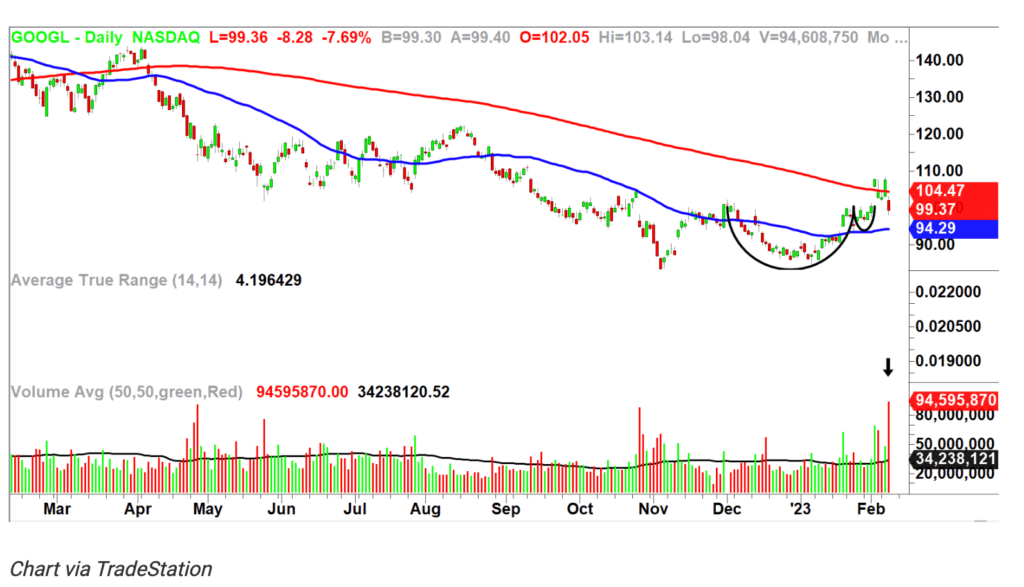For the first time in memory, Google’s search dominance is facing a legitimate threat. Let’s see what that means.
In a news item that almost seems like science fiction, Alphabet (GOOGL) lost over $100 billion in market capitalization on Wednesday due to a technical error. The stock fell 8% when the company’s new AI chatbot, Bard, shared incorrect information.
Does Wednesday’s selloff create an opportunity? Let’s go to the charts to find out.
Just a week ago, Alphabet’s chart was looking good. The stock had broken out of a bullish cup and handle formation (curved lines), and closed above its 200-day moving average (red) for the first time since April of last year.

After Wednesday’s flop, Alphabet is back below that key moving average, hovering at the breakout point of the cup and handle. The stock sold off on nearly triple its normal volume (arrow), Alphabet’s highest turnover since February. This is an indication of heavy institutional selling, and a warning that the stock could move lower.
Alphabet has a bigger problem than getting the bugs out of Bard. According to Statista, as of December 2022, Google dominated online search with an 84.08% market share. Microsoft’s Bing had only 8.95%.
Now that Bing is integrating ChatGPT, Google has a lot to lose. The successor to Microsoft’s often-derided, now-retired Internet Explorer browser is now a legitimate threat to siphon market share, along with ad dollars, from Google.
Why have chatbots become so important, so quickly? Unlike a search engine, which simply pulls information from the internet, a chatbot provides personalized results. Chatbots could make search engines like Google obsolete.
For example, a search for poetry on Google provides over 1.3 billion links in less than a second. A chatbot, on the other hand, can be instructed to create poems with specific style, tone, and content.
There are reports that in late December, Google declared “code red” in response to the suddenly ubiquitous ChatGPT, a chatbot created by OpenAI. OpenAI is a privately-held, San Francisco-based company that was funded in part by Elon Musk.
Earlier this month, in response to the sudden popularity of ChatGPT, Microsoft (MSFT) announced it was integrating the chatbot into its search engine, Bing. That was followed by this week’s introduction of Google’s AI product, called Bard.
Why did these companies adapt AI technology so quickly? Both Microsoft and Alphabet were faced with a threat that could undermine their search engines. Quick action was needed. Fast action can create results, but it also leads to mistakes, like the one Bard made on Wednesday.
Bottom line: For the first time in memory, Google’s search dominance is facing a legitimate threat. The stock’s suddenly discounted price may appear to be an opportunity, but heavy institutional selling is a warning that Alphabet could move lower before it finds its footing.
Source: finance.yahoo.com

